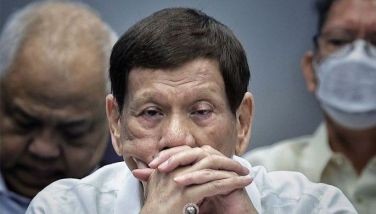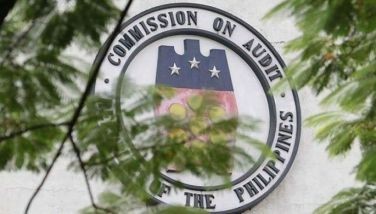Comelec gun ban starts Dec. 15
December 1, 2003 | 12:00am
The Commission on Elections (Comelec) is clamping down on gun ownership five months ahead of crucial elections despite objections from pro-gun lobbyists concerned about increasing lawlessness and violence.
Comelec Chairman Benjamin Abalos said security forces would enforce a "total gun ban" for six months from Dec. 15, when registration opens for the presidential and congressional elections.
Even civilians with permits will be barred from carrying their weapons.
But threats from armed rebel groups and the increasing boldness of criminal gangs in the country, dubbed as the East’s "wild, wild West," are being used as ammunition by the pro-gun lobby seeking easier gun ownership rules.
Rep. Juan Miguel Zubiri argues that rules should be relaxed as a licensed firearm ensures "survival" during the often bloody election campaign.
Zubiri, who owns several licensed handguns, is up for re-election in May in Bukidnon in the heart of Mindanao, where Muslim kidnap gangs and communist rebels move about with impunity.
Zubiri was issued a permit to carry a gun outside his home for protection after intelligence reports said that Muslim kidnap gangs operating in his province were planning to abduct him.
"There are certain justifiable reasons to carry a firearm to defend yourself, and many of us in the public service are in high risk positions," Zubiri told AFP in a recent interview.
"I am willing to give up all my licensed firearms and (the) permit to carry (them) if government takes control of the situation, eradicates criminal syndicates and if there is true peace and order," he said.
Zubiri said he knew of a former town mayor who was ambushed by communist rebels while returning from a campaign sortie.
"He could have fought back and be alive today if he had a gun," he said.
The communist New People’s Army is known to extort "campaign fees" from politicians who stray into areas they control.
Under existing laws, Filipinos are allowed to own one rifle or shotgun and a handgun, which should be kept at home for protection. Permits to carry them are only issued to those who can prove that their lives are under threat.
The government issued an order last January revoking tens of thousands of permits that had allowed private individuals to publicly carry guns. Anti-crime organizations estimate there are about 300,000 loose firearms in Metro Manila alone.
Nandy Pacheco, a campaigner for the Gunless Society of the Philippines, said politicians who could not campaign without armed bodyguards should not run at all.
"A gun is made to kill and maim — not to prolong life. Violence begets more violence," Pacheco said.
He said crimes were few in countries where there were strict gun-control laws like Japan, South Korea, Malaysia and Singapore.
Military statistics show that at least 98 people — including 24 government officials — were killed in election-related violence in the run-up to the last congressional elections in May 2001.
The toll was the highest since the fraud-tainted snap presidential elections in 1986 when 153 people were killed.
Gina Angangco, a spokeswoman for the Arms Corporation of the Philippines (Armscor), the country’s leading firearms and ammunition maker, said that many people bought guns because they feared becoming crime statistics in newspapers.
"There is a common saying that when guns are outlawed, only outlaws will have guns," she said, noting that studies have shown that only a small percentage of licensed firearms are ever used in crime.
And, she asked, "When you go campaigning in the provinces, do you see a policeman every so many kilometers watching out for you?" — AFP
Comelec Chairman Benjamin Abalos said security forces would enforce a "total gun ban" for six months from Dec. 15, when registration opens for the presidential and congressional elections.
Even civilians with permits will be barred from carrying their weapons.
But threats from armed rebel groups and the increasing boldness of criminal gangs in the country, dubbed as the East’s "wild, wild West," are being used as ammunition by the pro-gun lobby seeking easier gun ownership rules.
Rep. Juan Miguel Zubiri argues that rules should be relaxed as a licensed firearm ensures "survival" during the often bloody election campaign.
Zubiri, who owns several licensed handguns, is up for re-election in May in Bukidnon in the heart of Mindanao, where Muslim kidnap gangs and communist rebels move about with impunity.
Zubiri was issued a permit to carry a gun outside his home for protection after intelligence reports said that Muslim kidnap gangs operating in his province were planning to abduct him.
"There are certain justifiable reasons to carry a firearm to defend yourself, and many of us in the public service are in high risk positions," Zubiri told AFP in a recent interview.
"I am willing to give up all my licensed firearms and (the) permit to carry (them) if government takes control of the situation, eradicates criminal syndicates and if there is true peace and order," he said.
Zubiri said he knew of a former town mayor who was ambushed by communist rebels while returning from a campaign sortie.
"He could have fought back and be alive today if he had a gun," he said.
The communist New People’s Army is known to extort "campaign fees" from politicians who stray into areas they control.
Under existing laws, Filipinos are allowed to own one rifle or shotgun and a handgun, which should be kept at home for protection. Permits to carry them are only issued to those who can prove that their lives are under threat.
The government issued an order last January revoking tens of thousands of permits that had allowed private individuals to publicly carry guns. Anti-crime organizations estimate there are about 300,000 loose firearms in Metro Manila alone.
Nandy Pacheco, a campaigner for the Gunless Society of the Philippines, said politicians who could not campaign without armed bodyguards should not run at all.
"A gun is made to kill and maim — not to prolong life. Violence begets more violence," Pacheco said.
He said crimes were few in countries where there were strict gun-control laws like Japan, South Korea, Malaysia and Singapore.
Military statistics show that at least 98 people — including 24 government officials — were killed in election-related violence in the run-up to the last congressional elections in May 2001.
The toll was the highest since the fraud-tainted snap presidential elections in 1986 when 153 people were killed.
Gina Angangco, a spokeswoman for the Arms Corporation of the Philippines (Armscor), the country’s leading firearms and ammunition maker, said that many people bought guns because they feared becoming crime statistics in newspapers.
"There is a common saying that when guns are outlawed, only outlaws will have guns," she said, noting that studies have shown that only a small percentage of licensed firearms are ever used in crime.
And, she asked, "When you go campaigning in the provinces, do you see a policeman every so many kilometers watching out for you?" — AFP
BrandSpace Articles
<
>
- Latest
- Trending
Trending
Latest
Trending
Latest
Recommended
































